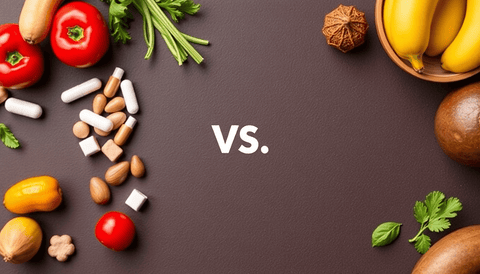Can Supplements Replace a Healthy Diet?
In recent years, more people are turning to supplements as a way to boost their health. Pills, powders, and vitamins flood the market claiming to provide all the nutrients you need. But the big question remains: can supplements replace a healthy diet? Let's explore how supplements and food compare and what role each should play in your daily routine.
Understanding Supplements vs Food
Dietary supplements are products like vitamins, minerals, herbs, or other substances meant to add nutritional value to your diet. They come in capsules, tablets, powders, or liquids and are designed to fill nutrient gaps. But supplements differ significantly from whole foods.
Whole foods include vegetables, fruits, grains, nuts, and animal products. They offer a complex mix of nutrients along with fiber, antioxidants, and other compounds that supplements just can't replicate. While supplements provide isolated nutrients, whole foods offer them in natural combinations.
Benefits of Whole Foods
Eating a variety of whole foods delivers a range of vitamins and minerals working together. This synergy helps your body absorb and use nutrients more effectively. For example, vitamin C in fruits helps your body absorb iron from plant-based sources.
Beyond vitamins and minerals, whole foods supply fiber, which supports digestion and heart health. Antioxidants from colorful fruits and vegetables protect your cells from damage. These benefits are hard to get from supplements alone.
Limitations of Dietary Supplements
Supplements can be useful, but they have limits. They can’t replace the full nutritional profile of a balanced diet. Nutrient absorption may also differ; some vitamins and minerals in supplements aren’t as easily absorbed as those from food.
Bioavailability—the body’s ability to use a nutrient—depends on many factors. For instance, fat-soluble vitamins like A, D, E, and K need dietary fat to be absorbed properly, which might be less effective if taken as a supplement without food.
Diet vs Multivitamins: Key Differences
Multivitamins are popular because they offer a bundle of nutrients in one dose. However, they can’t replace a healthy diet. Many nutrients are better absorbed from food due to their natural form and the presence of other compounds that aid absorption.
For example, calcium from dairy products is usually absorbed better than calcium in supplements. Similarly, the B vitamins you get from whole grains come with fiber and other nutrients missing from pills.
Supplements for Nutrient Gaps
Supplements can play a helpful role in filling specific nutrient gaps. People with dietary restrictions, such as vegetarians, may lack certain nutrients like vitamin B12 or iron and benefit from supplements.
Older adults, pregnant women, and those with certain medical conditions may also require extra nutrients. Supplements provide a convenient option to ensure adequate intake without drastically changing diet.
Minerals in Diet vs Supplements
Minerals in foods often come in forms that are easier for the body to absorb. For example, magnesium found in leafy greens is typically better absorbed than magnesium supplement tablets.
However, mineral supplements carry risks if taken in excess. Too much iron or calcium can cause health issues. It’s important to use supplements carefully and under guidance.
Tips for Combining Supplements with a Healthy Diet
To get the most benefit, think of supplements as a support system rather than a replacement. Focus first on eating a balanced diet rich in whole foods.
Use supplements when needed to fill gaps but avoid over-reliance. Always talk with a healthcare professional before starting any new supplement to ensure it’s safe and necessary.
Conclusion
Supplements vs food is a common debate with no simple answer. Supplements support but don’t replace the benefits of a healthy diet. Whole foods provide a complex nutrient mix essential for overall wellness.
Prioritize a balanced diet first. Use supplements wisely to fill specific needs and always seek expert advice. This approach helps you achieve better health naturally and sustainably.



